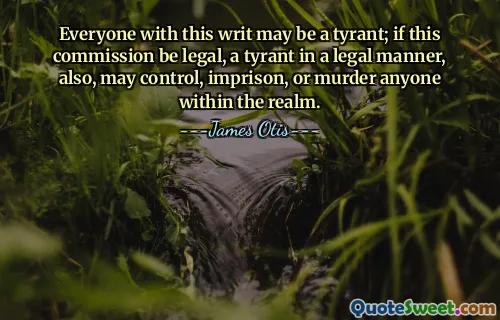James Otis was an influential American lawyer, political activist, and outspoken critic of British colonial rule in the 18th century. He is best known for his role in advocating for the rights of the colonists, arguing against taxation without representation. Otis's famous phrase, "Taxation without representation is tyranny," became a rallying cry for those who sought independence from British rule. His legal and philosophical writings laid the groundwork for revolutionary ideas that would shape the future of the United States. Throughout his career, Otis published various works that emphasized the importance of individual rights and the rule of law. He believed that every colonist deserved a voice in government decisions that affected their lives. His legal battles, particularly against the Writs of Assistance—documents that allowed British officials to search homes and businesses without warrants—further solidified his reputation as a champion of civil liberties. His fiery speeches and persuasive arguments galvanized public opinion against oppressive British policies. Otis's health declined in later years, but his legacy endured. He was a pivotal figure in the early stages of the American Revolution, inspiring others to take up the cause for independence. Although he did not live to see the eventual success of the revolutionary effort, his ideas continued to influence the founding fathers and future generations. Today, he is remembered as a key architect of American liberty and a forebear of civil rights advocacy.
James Otis was an essential figure in the fight for American independence, known for his legal expertise and passionate activism. His contributions to the American Revolution and his commitment to individual rights shaped the early political landscape of the United States.
Otis's philosophy centered around the belief that government derives its authority from the consent of the governed. His arguments against British policies were rooted in Enlightenment ideals, emphasizing freedom, justice, and the need for representation.
Despite facing health challenges, Otis's influence remained strong, inspiring others to pursue the ideals of liberty and justice. His legacy continues to resonate, showcasing the importance of standing up for one's rights against oppression.
Daha Fazlasını Gör »
Today Birthdays
1729 -
Edmund Burke
1949 -
Haruki Murakami
1954 -
Howard Stern
1876 -
Jack London
1993 -
Zayn Malik
1951 -
Kirstie Alley
1863 -
Swami Vivekananda
1923 -
Alice Miller
1987 -
Naya Rivera
1825 -
Brooke Foss Westcott
1944 -
Joe Frazier
1951 -
Rush Limbaugh
1964 -
Jeff Bezos
1978 -
Jeremy Camp
1628 -
Charles Perrault
1856 -
John Singer Sargent
1970 -
Kaja Foglio
1953 -
Rick Santelli
1986 -
Gemma Arterton
1968 -
Raf Simons
1958 -
Christiane Amanpour
1966 -
Olivier Martinez
1996 -
Ella Henderson
1917 -
Maharishi Mahesh Yogi
1949 -
Ottmar Hitzfeld
1928 -
Ruth Brown
1968 -
Heather Mills
1946 -
George Duke
1968 -
Rachael Harris
1923 -
Ira Hayes
